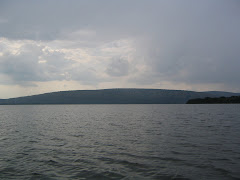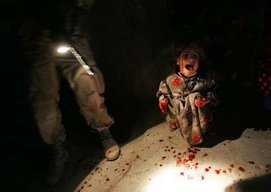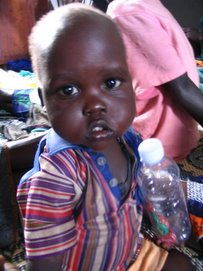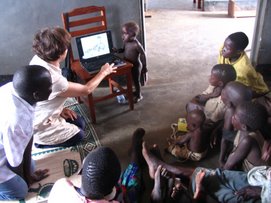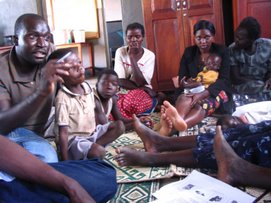Northern Ugandans are hoping the rebel Lord's Resistance Army will soon sign a peace agreement with President Yoweri Museveni's government. Their hope is understandable. The LRA's 21-year insurgency and the Ugandan government's response have largely destroyed the region north of the Nile and south of Sudan. But resolving the conflict largely hinges on the enigmatic chairman of the LRA, Joseph Kony.He is the primary reason why the rebels have long been regarded as the most perplexing in sub-Saharan Africa.
Supposedly possessed of supernatural powers at a young age, the Holy Spirit told a 20-something Kony to fight President Yoweri Museveni's government. Followers say he received other spirits, including: Juma Oris, a cabinet minister who served in the late Idi Amin's government; a Sudanese woman named Silli Silindi; an American called King Bruce; and one known as Who Are You? The motivation most commonly attributed to the LRA was to overthrow the Kampala government and establish rule of law according to the Ten Commandments.Yet the rebels contradict that belief in divine law with their forced recruitment of children to fill their ranks and their reliance on extreme violence.
As Matthew Green recounts in his fine book, "The Wizard of the Nile," the Reuters news agency dutifully noted for years that the rebels "are reviled for cutting off their victims' ears and padlocking their lips." No surprise that a major in the Ugandan Peoples Defence Forces (UPDF) told this writer in January 2005 that the war in the north should be easily resolved. At the time, the rebels barely mustered a public presence. Many Ugandans had already judged Kony a sociopathic menace and never crossed Karuma Falls bridge, the demarcation point between the south and the north.
Since then, the LRA has abandoned its base in southern Sudan and resettled in Garamba National Park in the Democratic Republic of Congo. It is now perceived as a destabilizing force in East Africa and beyond, if current speculation about a move into the Central African Republic proves to be true.
Labeled a terrorist organization by the U.S. government, the LRA's Kony and four commanders were indicted by the International Criminal Court in 2005 for crimes against humanity and war crimes. The circumstances convinced the rebels to enter into peace talks a year later with Museveni's government. The two sides have reached the precipice of a deal, which would make rebels eligible for military, government and diplomatic posts, only to see Kony back away from it in April.Still, the negotiations allowed the LRA to recast itself, at least in rhetoric, into a movement motivated by nationalist grievance.
Notes purportedly written by a representative of Kony, forwarded to World Politics Review from an Acholi website, outline the reasons for suspending participation in the peace talks. These include everything from the LRA's lack of faith in Southern Sudanese Vice President Riek Machar as a neutral mediator to the Ugandan government's lack of seriousness about ICC "interference" in attempting to prosecute LRA leaders while excusing the other party. "I cannot sign an agreement when displaced people are still suffering in the camps. What peace agreement would that be? It was not the LRA that forced people into the camps. The government and its army did that," reads a passage credited to Kony.His complaint is not easily dismissed.
Museveni's government did usher northern Ugandans into displacement camps in 1996 to allow the UPDF to crush the LRA. Ten years later, between 1.6 million and 1.8 million people lived in the IDP camps, surviving on handouts from the World Food Programme, and the rebels remained a threat. As Green points out, this internment strategy created "giant incubators of disease, alienation and despair." A 2005 study by the World Health Organization documented 1,000 deaths per week, mostly from malaria, HIV/AIDS and violence. And yet, the statistic more commonly associated with Uganda is economic growth that has averaged more than 5 percent since 2000, which is largely restricted to the southGreen, the Financial Times' West Africa bureau chief, correctly understands Uganda's bifurcated nature as a product of its colonial and post-colonial history.
The British first recruited the Acholi into the military to cement a divide-and-rule policy that favored the Baganda, the largest ethnic group, for the civil service. After independence, the military abilities of the Acholi made them an influential minority, at turns oppressive and suppressed. Two Acholi officers led the 1985 coup that ended Milton Obote's second presidency, and their soldiers rioted in Kampala. Less than a year later, Museveni, who rebelled against Obote's disputed 1980 election victory, seized power and sent his soldiers north to impose control. Their execution of civilians and looting of goods and cattle is acutely felt by some Acholi today, and their original abuses provided the impetus for Kony's rebellion.What makes Green's book so valuable is that he demystifies the LRA. He reports that the upper ranks are populated with former military officers from the 1980s who understand military structure and strategy.
The rebels have organized themselves into five brigades with a central command known as the "control altar," and they possess sophisticated weapons such as anti-tank rifles, rocket-propelled grenades and landmines. Their violence, according to Green, is not random; villagers suspected of helping the UPDF are mutilated. Massacring civilians made it clear that they could never mobilize against the LRA because Museveni's government could never protect them.To his immense credit, Green confirms that some Acholi in the IDP camps collaborate with the rebels by buying boots and supplies for them. Some donate because they want to help their captive relatives or because they are given assurances that the LRA's goal is to overthrow Museveni. In parts of the Acholi diaspora, Kony is seen as he perceives himself to be -- as a liberator, a "genuine freedom fighter."
However, Green concludes that the LRA's persistence is less a testament to his leadership and more the symptom of a national malaise. "Museveni's failure was not his inability to kill one man, it was his failure to convince people north of the Nile that he cared."That cannot exculpate the LRA's violence and its cruelty to its Acholi kin and other ethnic groups in northern Uganda. Nor does Green explicitly indicate whether Kony can resolve himself to signing a peace deal. Green deserves praise for recognizing that journalists in sub-Saharan Africa also engage in myth-making and stereotypes of violence. "There was something irresistible about the idea of Kony as darkness personified in the heart of Africa, enslaving women, summoning spirits," Green writes. "Voodoo, harems, barbarism and magic -- he was every primitive cliché rolled into one."When that's removed, what remains is ample reason for skepticism about any peace agreement.
Kony has likely killed two of his deputies, and fellow indictees, over disagreements, which augurs poorly for potential moderates. If his forces are on the run, then they could prey on civilians in the Democratic Republic of Congo, Sudan or even the Central African Republic. Meanwhile, northern Uganda will not be helped by an agreement that is promoted out of political expediency by Museveni's government. If no one is sanctioned for violence, then impunity shall reign.
Wednesday, May 7, 2008
Uganda: Hasn't the 'Genocide' in the North Been a Fortune?
This artcle was written by a reknown political analyst-Sam Akaki, i know some of you could have read it but due to its thoroughness, i decided to reproduce it here. Ladies and Gentle men, read it.
Never in the field of human conflict was so much owed by so many to so few", British World War Two Prime Minister, Mr Winston Churchill, the one who named Uganda "The Pearl of Africa" once said.
Today, as Joseph Kony refuses to sign the long-awaited peace accord, Mr Churchill must be turning in his grave, agonising about northern Uganda, where he passed through on his way to the Sudan and Egypt, according to his 1908 book, 'My Africa Journey', which mentions one Jemisi Opoka, as a porter.
In his agony, Mr Churchill might paraphrase is famous statement and say, instead, "Never in the field of human conflict has so few benefited so much from the innocent blood of so many men, women and children".
From life-career warmongers who waged a self-serving wars in Luwero, the DR Congo, the Sudan and are now in Somalia - to the unemployed and unemployable who became instant peace negotiators; from international arms traders posing as diplomats, civil servants to small time local crooks - all have made fortunes, literally, from the 20-year-long genocide in northern Uganda.
Genocide, incidentally, "means any of the following acts committed with intent to destroy, in whole or in part, a national, ethnical, racial or religious group, as such: (a) Killing members of the group; (b) Causing serious bodily or mental harm to members of the group; and (c) Deliberately inflicting on the group conditions of life calculated to bring about its physical destruction in whole or in part," (Articles II and III of the 1948 Convention on the Prevention and Punishment of Genocide).
How was genocide allowed to become a gold mine? On February 25, 2002, former Mwenge South MP Dora Byamukama tabled a parliamentary motion calling on the government to declare the north a disaster area. The government rejected the motion, despite unanimous approval by Parliament!
In 2002, Uganda diverted 23% of the national budget, over 50% of which came from the donors, to defence, specifically to wage war in the north. And on July 4, 2007, the British Secretary for International Development Douglas Alexander told the House of Commons: "The Juba Peace Initiative Fund (JPIF) had an initial operational budget of $4.2 million. This has been fully funded by donors, and will be used to pay allowances and related expenses".
To prove the point, recently, the Sunday Monitor reported that "Dr David Matsanga, the (former) LRA lead negotiator", had been "arrested by South Sudanese soldiers at Juba Airport in possession of $20,000".
Shortly afterwards, Maj. Gen. James Kazini, the former Army Commander was sentenced to a three-year jail term for profiteering from the existence of ghost soldiers on the UPDF payroll.
According to the ghost-soldier report by former Defence Minister Amama Mbabazi, "there was Shs1.9 billion still on the salary account as remainder from payment of soldier's salaries as of May 2003. The money "used to disappear without a trace," the report concluded.
Of course the money can be traced to those palaces, top-of-the range cars and business premises which dot the hills and valleys in Uganda. Very few, if any of the owners of these assets obtained a loan from any financial institution to acquire them. They paid in cash, in blood money!
Makerere and foreign university departments of "peace studies" are also benefiting from the genocide. Students who spend time in the concentration camps to gather "empirical" evidence are guaranteed excellent grades and jobs, if they are well connected. Thousands of office-based and brief-case NGOs have cropped up in Uganda and abroad, purporting to be assisting the surviving orphans, child soldiers and rape victims of genocide.
Local and international arms dealers, and some UPDF officers, have used the genocide as "cloud cover" to conduct lucrative arms trade with the Lord's Resistance Army (LRA) rebels, dissident armed groups in Southern Sudan and Darfur.
The World Bank and the International Monetary Fund have also used the proceeds of genocide to justify wasted donor funds. Factoring in all "blood-related" assets and employment as clear signs of "robust" economic activities, they produced misleading reports claiming that Uganda was recording a "consistent" high economic growth rate since 1990, a period coinciding with the genocide in the north.
To cap it all, President Museveni is likely to benefit the most from the genocide. Sooner or later, self-confessed LRA terrorists Mr Onen Kamdulu and Ms Jennifer Aryemo will give evidence, ensuring Dr Kizza Besigye's conviction and possible execution for working with Mr Joseph Kony to topple the government of Uganda by force of arms! Hasn't the genocide in the north been a political and financial gold mine for a few?
Never in the field of human conflict was so much owed by so many to so few", British World War Two Prime Minister, Mr Winston Churchill, the one who named Uganda "The Pearl of Africa" once said.
Today, as Joseph Kony refuses to sign the long-awaited peace accord, Mr Churchill must be turning in his grave, agonising about northern Uganda, where he passed through on his way to the Sudan and Egypt, according to his 1908 book, 'My Africa Journey', which mentions one Jemisi Opoka, as a porter.
In his agony, Mr Churchill might paraphrase is famous statement and say, instead, "Never in the field of human conflict has so few benefited so much from the innocent blood of so many men, women and children".
From life-career warmongers who waged a self-serving wars in Luwero, the DR Congo, the Sudan and are now in Somalia - to the unemployed and unemployable who became instant peace negotiators; from international arms traders posing as diplomats, civil servants to small time local crooks - all have made fortunes, literally, from the 20-year-long genocide in northern Uganda.
Genocide, incidentally, "means any of the following acts committed with intent to destroy, in whole or in part, a national, ethnical, racial or religious group, as such: (a) Killing members of the group; (b) Causing serious bodily or mental harm to members of the group; and (c) Deliberately inflicting on the group conditions of life calculated to bring about its physical destruction in whole or in part," (Articles II and III of the 1948 Convention on the Prevention and Punishment of Genocide).
How was genocide allowed to become a gold mine? On February 25, 2002, former Mwenge South MP Dora Byamukama tabled a parliamentary motion calling on the government to declare the north a disaster area. The government rejected the motion, despite unanimous approval by Parliament!
In 2002, Uganda diverted 23% of the national budget, over 50% of which came from the donors, to defence, specifically to wage war in the north. And on July 4, 2007, the British Secretary for International Development Douglas Alexander told the House of Commons: "The Juba Peace Initiative Fund (JPIF) had an initial operational budget of $4.2 million. This has been fully funded by donors, and will be used to pay allowances and related expenses".
To prove the point, recently, the Sunday Monitor reported that "Dr David Matsanga, the (former) LRA lead negotiator", had been "arrested by South Sudanese soldiers at Juba Airport in possession of $20,000".
Shortly afterwards, Maj. Gen. James Kazini, the former Army Commander was sentenced to a three-year jail term for profiteering from the existence of ghost soldiers on the UPDF payroll.
According to the ghost-soldier report by former Defence Minister Amama Mbabazi, "there was Shs1.9 billion still on the salary account as remainder from payment of soldier's salaries as of May 2003. The money "used to disappear without a trace," the report concluded.
Of course the money can be traced to those palaces, top-of-the range cars and business premises which dot the hills and valleys in Uganda. Very few, if any of the owners of these assets obtained a loan from any financial institution to acquire them. They paid in cash, in blood money!
Makerere and foreign university departments of "peace studies" are also benefiting from the genocide. Students who spend time in the concentration camps to gather "empirical" evidence are guaranteed excellent grades and jobs, if they are well connected. Thousands of office-based and brief-case NGOs have cropped up in Uganda and abroad, purporting to be assisting the surviving orphans, child soldiers and rape victims of genocide.
Local and international arms dealers, and some UPDF officers, have used the genocide as "cloud cover" to conduct lucrative arms trade with the Lord's Resistance Army (LRA) rebels, dissident armed groups in Southern Sudan and Darfur.
The World Bank and the International Monetary Fund have also used the proceeds of genocide to justify wasted donor funds. Factoring in all "blood-related" assets and employment as clear signs of "robust" economic activities, they produced misleading reports claiming that Uganda was recording a "consistent" high economic growth rate since 1990, a period coinciding with the genocide in the north.
To cap it all, President Museveni is likely to benefit the most from the genocide. Sooner or later, self-confessed LRA terrorists Mr Onen Kamdulu and Ms Jennifer Aryemo will give evidence, ensuring Dr Kizza Besigye's conviction and possible execution for working with Mr Joseph Kony to topple the government of Uganda by force of arms! Hasn't the genocide in the north been a political and financial gold mine for a few?
Uganda rebels say Kony will meet mediators
Uganda's fugitive guerrilla Joseph Kony will meet mediators on Saturday on the Sudan-Congo border and may even sign a final peace deal, a rebel negotiator said on Wednesday.
But the leader of the Lord's Resistance Army (LRA) still wants more details on how Uganda's government plans to use traditional reconciliation rituals to help him avoid prosecution for war crimes by the International Criminal Court.
Talks to end Kony's 22-year insurgency looked to have collapsed last month when the LRA commander sacked his chief negotiator and then failed to appear at a signing ceremony in a forest clearing on the remote frontier.
Kony's new negotiator, James Obita, told Reuters that the elusive rebel boss would turn up this time.
"On May 10 Kony is ready to meet leaders from northern Uganda, the mediator (south Sudan's Vice President Riek Machar) and probably sign the final peace agreement," he said.
"But he requests that we hold a workshop to clarify the relationship between the traditional justice systems and the ICC."
Uganda's civil war has killed tens of thousands of people, uprooted 2 million more and destabilised neighbouring parts of oil-producing southern Sudan and mineral-rich eastern Congo.
This year, LRA fighters have also attacked villages and killed civilians in Central African Republic, aid workers say.
Obita was among LRA representatives visiting the Ugandan capital Kampala for talks with religious and traditional leaders on how to save nearly two years of negotiations.
At the centre of their discussions is a government offer to call for the scrapping of ICC indictments naming LRA leaders if Kony signs a final peace deal. Ancient northern Uganda reconciliation rituals would be used instead, it says.
Kony and two of his top deputies are wanted for war crimes including rape, murder and the kidnapping of thousands of children to serve as fighters, porters and sex slaves.
One of those deputies, Okot Odhiambo, was said to have been killed in fierce inter-LRA fighting last month.
The Hague-based ICC says its warrants remain active, and that Uganda is legally obliged to hand over its targets.
On Wednesday, a group of 40 non-governmental organisations urged all parties in the conflict not to give up on talks.
"A failure to secure the peace and resort to a `military solution' would trigger renewed fears of insecurity and threaten the considerable progress made on the ground in northern Uganda," it said.
But the leader of the Lord's Resistance Army (LRA) still wants more details on how Uganda's government plans to use traditional reconciliation rituals to help him avoid prosecution for war crimes by the International Criminal Court.
Talks to end Kony's 22-year insurgency looked to have collapsed last month when the LRA commander sacked his chief negotiator and then failed to appear at a signing ceremony in a forest clearing on the remote frontier.
Kony's new negotiator, James Obita, told Reuters that the elusive rebel boss would turn up this time.
"On May 10 Kony is ready to meet leaders from northern Uganda, the mediator (south Sudan's Vice President Riek Machar) and probably sign the final peace agreement," he said.
"But he requests that we hold a workshop to clarify the relationship between the traditional justice systems and the ICC."
Uganda's civil war has killed tens of thousands of people, uprooted 2 million more and destabilised neighbouring parts of oil-producing southern Sudan and mineral-rich eastern Congo.
This year, LRA fighters have also attacked villages and killed civilians in Central African Republic, aid workers say.
Obita was among LRA representatives visiting the Ugandan capital Kampala for talks with religious and traditional leaders on how to save nearly two years of negotiations.
At the centre of their discussions is a government offer to call for the scrapping of ICC indictments naming LRA leaders if Kony signs a final peace deal. Ancient northern Uganda reconciliation rituals would be used instead, it says.
Kony and two of his top deputies are wanted for war crimes including rape, murder and the kidnapping of thousands of children to serve as fighters, porters and sex slaves.
One of those deputies, Okot Odhiambo, was said to have been killed in fierce inter-LRA fighting last month.
The Hague-based ICC says its warrants remain active, and that Uganda is legally obliged to hand over its targets.
On Wednesday, a group of 40 non-governmental organisations urged all parties in the conflict not to give up on talks.
"A failure to secure the peace and resort to a `military solution' would trigger renewed fears of insecurity and threaten the considerable progress made on the ground in northern Uganda," it said.
Hopes for Peace: Dwindling
An ardent fan of "Lwani" inquired from me two days ago if i still honestly believe that Kony will put pen to paper let alone formally commit himself to peace. I replied in a lengthy e-mail to him and i will share with all of you today that my hopes for a peaceful northern Uganda seem to be dwindling faster than i'd ever anticipated.
There is an apparent information gap right now. No one seems to know exactly waht either side is up to. Mr. machar says he has lost track of Kony, Kaguta and Amama seem in bullish mood while Rugunda remains optimistic. It leaves you wondering what the common man on the dusty paths of Attiak or Omia Anyima is thinking.
But the little hope i have is that there will be no recourse to war. Otherwise all the semblances of strides towards normalcy in th north will be lost.
There is an apparent information gap right now. No one seems to know exactly waht either side is up to. Mr. machar says he has lost track of Kony, Kaguta and Amama seem in bullish mood while Rugunda remains optimistic. It leaves you wondering what the common man on the dusty paths of Attiak or Omia Anyima is thinking.
But the little hope i have is that there will be no recourse to war. Otherwise all the semblances of strides towards normalcy in th north will be lost.
Subscribe to:
Comments (Atom)


